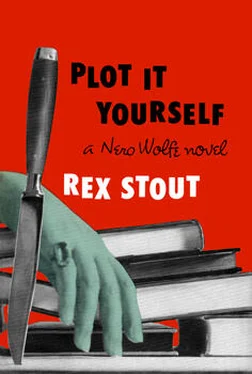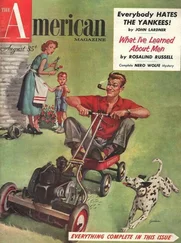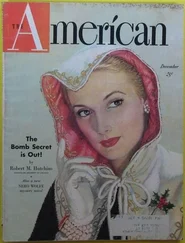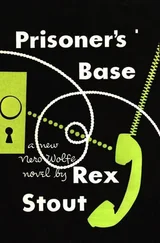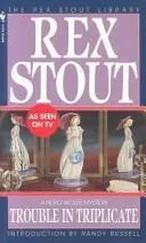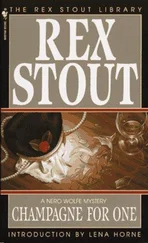Hopeless.
Another question: what was the committee going to do now? In Gerald Knapp’s opinion, it should do nothing. It should await events. Since the police were assuming that the murderer had been motivated by the urgent necessity to silence Jacobs, they would concentrate on the effort to learn who had written the stories and instigated the claims, and, though that would have its disagreeable aspects, it meant that the purpose for which the committee was formed was now being served by the vast resources of the New York police, and in comparison the resources of the committee were nothing. Philip Harvey agreed, possibly because for the third time in nine days he had had to be up and out before noon and he wanted to catch up on his sleep. Amy Wynn supposed it wouldn’t hurt to wait and see what the police did. Cora Ballard thought there should be a special meeting of the NAAD council to consider the matter, that the council had authorized the committee to deal with plagiarism claims, not with murder.
But Thomas Dexter and Mortimer Oshin couldn’t see it, and neither could Reuben Imhof. They were all emphatic that Wolfe should be told to go ahead, though for different reasons. Imhof’s point was that there was no telling how long it would take the police to find the plagiarist, if they ever did, and their messing around and the publicity would be bad for both publishers and authors. Oshin’s point was more personal. He had put up ten thousand dollars in cash in the hope that it would help to stop Kenneth Rennert, and he wanted Wolfe to go ahead and use it for that purpose, with or without the concurrence of the committee. Thomas Dexter’s point was even more personal, as you saw from the speech he made to Harvey. He regarded himself as guilty of incitation to murder. Apparently he had an old-fashioned conscience. He went on to say that he couldn’t shift his responsibility to the police, he wanted Wolfe to go ahead and spare no pains or expense, and he would contribute any sum that might be required. He didn’t even say “within reason.”
He ended by making a motion, and the chairman asked for hands. Three went up at once — Dexter’s, Imhof’s, and Oshin’s. Then Amy Wynn’s, not with enthusiasm. Cora Ballard remarked that she wasn’t a committee member and couldn’t vote. Gerald Knapp asked her to record him as voting nay.
“Even if the chairman could vote,” Harvey said, “it would be four to two.” He turned to Wolfe. “So you go ahead. The last time you went ahead you got a man killed. What next?”
“That’s pretty raw,” Oshin said. “It was my idea, and the vote was unanimous.”
Harvey ignored him. He repeated to Wolfe, “What next?”
Wolfe cleared his throat. “I am twice a jackass,” he said.
They stared. He nodded. “First, I should never have accepted a committee as a client. That was egregious. Second, I should not have consented to act as a mere conveyor of bait. That was fatuous. It dulled my faculties. Having become a party to a procedure which made an obvious target of a man, which put a man in imminent danger, and aware that all of you knew of it and others soon would, I was an ass not to take precautions. I should have seen to it that he was not harmed. It was even quite possible that one of you was the wretch I had engaged to expose.”
“Sure,” Harvey said. “Now you’re getting hot.”
“It could be you, Mr. Harvey. With your most successful book only in its ninth thousand, you must have been open to temptation. So while I do not have Mr. Dexter’s feeling of guilt, that I incited to murder, I do strongly feel that I failed to function properly. But for my default Mr. Jacobs would be alive, and probably we would have our man. It was understood that you may terminate your engagement with me at will. I invite you to do so now.”
Three of them said no — Oshin, Imhof, and Dexter. The others said nothing. Wolfe asked the chairman, “Do you want a vote on it, Mr. Harvey?”
“No,” Harvey said. “It would be four to one again.”
“It would be unanimous,” Gerald Knapp said. “I did not suggest that we should terminate the engagement.”
Wolfe grunted. “Very well. I should tell you that if you do terminate it, I shall not withdraw. I have a score to settle — with myself. I have bruised my self-esteem and I intend to heal it. I am going to expose the murderer of Simon Jacobs, anticipating the police if possible, and presumably that will also solve your problem. I shall do that in any case, but if I act as your agent it must be with a free hand. I won’t tell you what I intend to do. If one of you makes a suggestion other than privately, as Mr. Oshin did, I’ll reject it without reference to its merits. Since I can’t rely on your discretion, you will have to rely on mine.”
“That’s a lot to ask,” Knapp said.
“No, sir. It is asking nothing; it is merely notifying you. If I told you I intended to do something and then did something else, I would still be your agent. You must trust my probity and my judgment in any case, or dismiss me.”
“What the hell,” Oshin said. “You’ve got my ten thousand, go ahead and use it.” He looked at his watch and stood up. “I’m late for an appointment.”
The meeting adjourned at 12:48 p.m. without a motion, Thomas Dexter stayed for a word with Wolfe, not to make a private suggestion but to repeat that he felt a personal responsibility and would personally contribute any necessary amount. This time, however, he added “within reason.” It’s fine to have a conscience, but you can’t just let it run wild.
When Dexter had gone, Wolfe leaned back and closed his eyes. I put the extra chairs back in place, treated myself to a good stretch, went to the kitchen and drank a glass of water, and returned. I stood and looked down at him.
“I was wondering,” I said. “Am I included in that?”
“In what?” he asked without opening his eyes.
“In the lockout. I won’t be much help if you refuse to tell me what you intend to do.”
“Pfui.”
“I’m glad to hear it. I would like to say that I have a little self-esteem too, of course not in the same class as yours, and it needs attention. Yesterday Purley Stebbins asked me, and I quote, ‘Why the hell did you set the guy up like that and then come here today and expect to find him whole?’ That was the first time a Homicide man has ever asked me a question I couldn’t answer. If I had told him because you were a jackass and so was I, he would have wanted to include it in my signed statement.”
He grunted. He hadn’t opened his eyes.
“So we’re to go ahead,” I said. “Lunch is about ready, and business is out at the table, and you like to rest your brain during digestion, so you might give me instructions now. Where do we start?”
“I have no idea.”
“It might be a good plan to get one, since you intend to anticipate the police. I suppose I could call on the committee members separately and ask for suggestions—”
“Shut up.”
So we were back to normal.
When Wolfe went up to the plant rooms at four o’clock I still had no instructions, but I wasn’t biting nails. During the hour and a half since lunch he had picked up his current book four times, read a paragraph, and put it down again; he had turned on the television three times and turned it off; he had counted the bottle caps in his desk drawer twice; and he had got up and walked over to the big globe and spent ten minutes studying geography. So, since he was hard at work, there was no point in needling him.
I passed the time — an hour of it in comparing the typewriting of “Opportunity Knocks,” by Alice Porter, with “There Is Only Love,” also by Alice Porter, and “What’s Mine Is Yours,” by Simon Jacobs. No two on the same machine. I reread the carbon of the statement I had given Purley Stebbins, found nothing that needed correcting, and filed it. I reread the piece in the morning Times about the murder, and when the Gazette came, around five-thirty, I read that. The Times had no mention of plagiarism or the NAAD or the BPA. The Gazette had a paragraph about the plagiarism charge Jacobs had made against Richard Echols in 1956, but there was no hint that his death had any connection with it. I was wondering why Lon Cohen hadn’t called when the phone rang and there he was. He stated his case: I had phoned him nine days ago to ask him about the NAAD and the BPA. Simon Jacobs, murdered Monday night, was a member of NAAD. Tuesday evening I had arrived at Homicide West on 20th Street with Sergeant Stebbins, who was working on the Jacobs case, and had stayed four hours. Would I therefore please tell him immediately why I had inquired about the NAAD, who was Wolfe’s client, and who had killed Jacobs and why, with all relevant details which the public had a right to know. I told him I would call him back as soon as I had anything fit to print, probably in a couple of months, and said I would be glad to send him a glossy of a photograph I had just taken, which the public had a right to see.
Читать дальше
